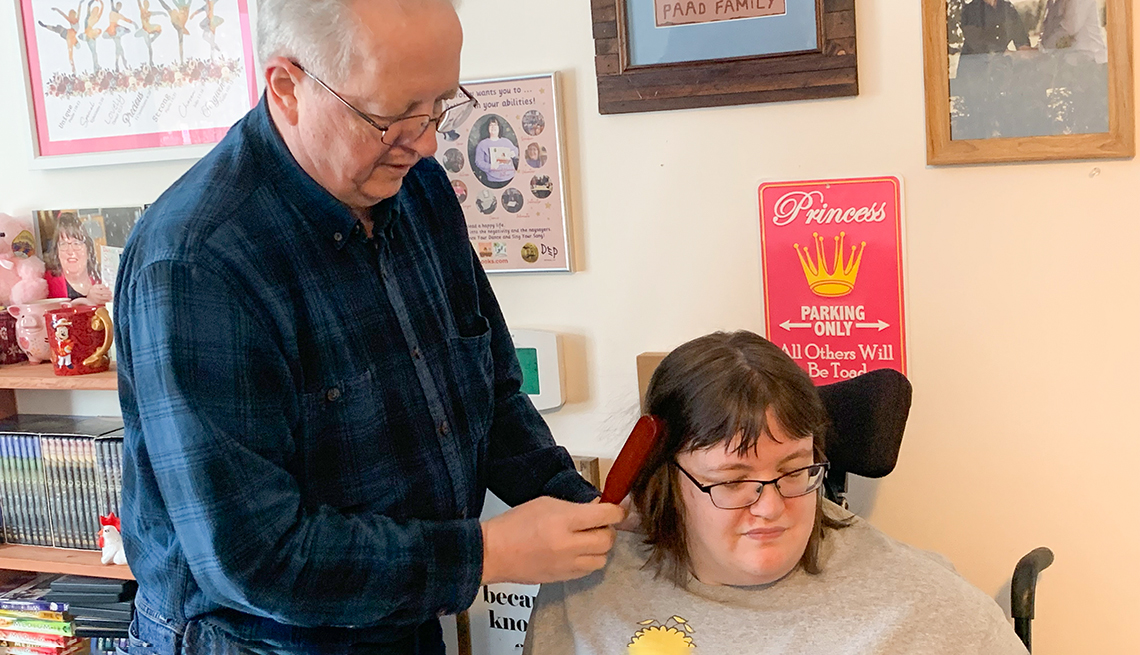AARP Hearing Center

Eric and Alice Paad spend 128 hours a week caring for their daughter, Dorothy, who was born with cerebral palsy. While their time is freely given, the wheelchair-accessible van, in-home help and other caregiving essentials are not free.
“It’s the card we were dealt in life, and we’ll play it as best we can,” says Eric Paad, 69, of Rapid River, in the Upper Peninsula. “But it does stretch us kind of thin.”
This year, AARP Michigan is urging state legislators to provide tax relief for family caregivers like the Paads. The concept has wide support in the state. In an October 2024 AARP poll of 1,382 Michigan voters, 85 percent of respondents 50 and older said they would support a tax credit for family caregivers.
Michigan has more than 1.2 million family caregivers who in 2021 provided an estimated 1.1 billion hours of unpaid care valued at $19.6 billion, AARP Public Policy Institute research shows. Those caregivers do everything from cooking and shopping for their loved ones to taking them to doctors’ appointments and managing their medications.
“As our population ages, we’re going to see more and more people have to stretch their own pocketbooks to help care for loved ones,” says Cassie Thierfelder, AARP Michigan’s advocacy manager.
Two other states—Oklahoma in 2023 and Nebraska in 2024—have passed laws creating tax credits of up to $3,000 per year for eligible family caregivers. The credits help cover costs such as hiring a home care aide or paying for home modifications.
Such a credit “would be a blessing,” says Paad, founder of the nonprofit Caregiver Incentive Project, which provides training and other supports for in-home caregivers, both paid and volunteer, in the Upper Peninsula.
Caring for older adults and people with disabilities in their homes can mean the difference between living versus simply existing, he says.
Last year, Gov. Gretchen Whitmer (D) proposed the Caring for MI Family Tax Credit. The credit, which failed to gain traction, would have given eligible caregivers a tax break of up to $5,000.
AARP is working to advance that idea in the Legislature this year, Thierfelder says. Ideally, relief would help as many caregivers as possible and cover home modifications, in-home health care help, transportation, special equipment and other costs, she says.
Whitmer’s plan called for a $37.5 million allocation for the tax credit to cover family caregivers tending to loved ones. AARP hopes Michigan’s divided Legislature, with Republican control of the House and Democratic control the Senate, can find common cause in caregiver assistance.
“At some point, most of us will either be caregivers or need caregiving,” Thierfelder says. The issue knows no political boundaries, she adds.
In addition to advocating for policy changes, AARP is sponsoring a webinar on Thursday, May 29, for caregivers tending to a loved one with dementia. The free, interactive event—part of a broader Ask the Doc series—will offer caregivers insight into the progression of dementia and ways to help maintain cognitive function and prevent decline.
Caregivers are hungry for information and advice, says Jim Mangi of Saline. Mangi, 76, cared for his late wife, Kathleen Schmidt Mangi, at home for about 10 years before she moved into a memory care facility. After a loved one’s initial diagnosis, the prospect of moving forward can feel daunting, he says.
“The doctor disappears as if they were beamed up to the Starship Enterprise,” Mangi says. “It’s diagnose and adios.”
Mangi started the Dementia Friendly Saline nonprofit to share caregiver information and foster community support. He recalls advice he received from a fellow support group attendee soon after his wife’s diagnosis with younger-onset Alzheimer’s.
“He said ‘You will be amazed at all that you can do and how well you can do it,’ ” Mangi recalls. “And it turns out he was 100 percent right.”
For more information on the caregiver tax credit or to register for the May dementia event, go to aarpmi.org/care.
Sarah Hollander, a freelance writer and former daily newspaper reporter in Cleveland, has written for the Bulletin for 16 years.
- How to Be a Caregiver for Someone With Dementia
- 12 Ways for Family Caregivers to Deal With Their Toughest Days
- What to Tell Grandkids When a Grandparent Has Dementia































































